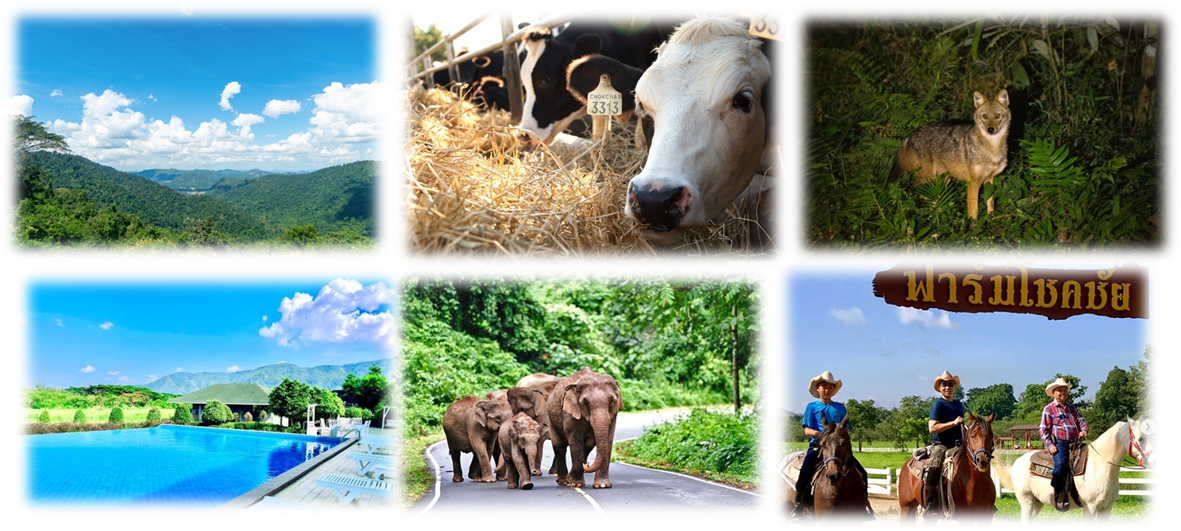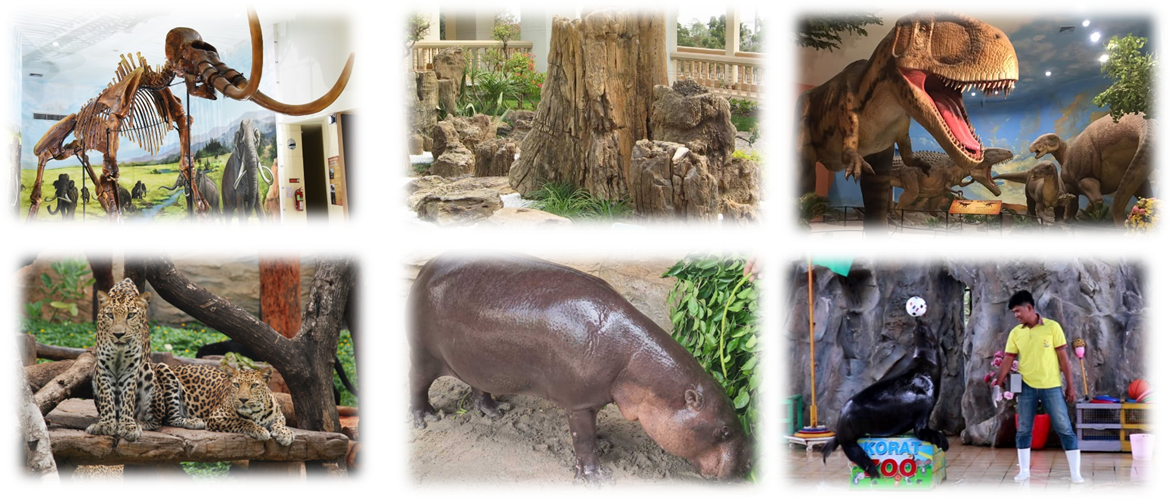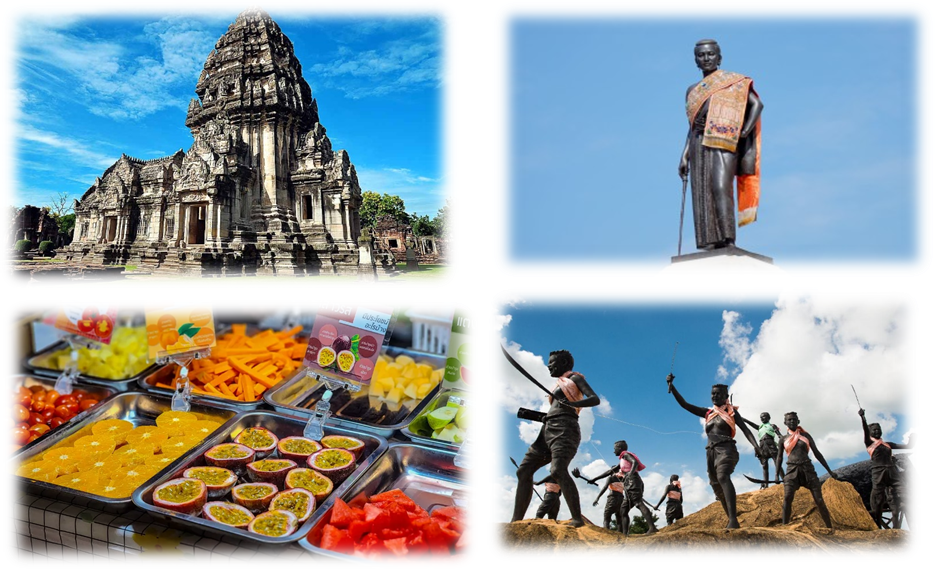5 Days 4 Nights
Daily Tour
15 people
___
Nakhon Ratchasima Province, also known as Korat, is recognized as “The UNESCO Triple Heritage City”, encompassing three significant designations:

Morning: Pick up at the airport.
12:00 – Have lunch.
13.00 – Farm Chokchai Farm. Chokchai is not only one of the largest dairy farms in Asia but also a popular agritourism destination. It won the Thailand Tourism Award from the Tourism Authority of Thailand four onsecutive times in 2006, 2008, 2010, and 2012, leading to its induction into the Hall of Fame. The farm is recognized for its systematic management, earning the distinction of being Thailand’s first standard dairy farm. Farm Chokchai offers a diverse range of agricultural tourism experiences. Visitors can learn about dairy farming, witness milking demonstrations, and enjoy cowboy-style shows, horseback riding, ATV rides, and sheep feeding. The farm features seasonal flower fields for picturesque photo opportunities. Guests can tour the farm via a tractor-pulled carriage or drive their personal vehicles to different activity zones.
17.00 – Check in at the Hotel.
18.00 – Have Dinner.
20.00 – Khao Yai National Park (Night Safari). Many animals are nocturnal in their foraging habits, such as sambar deer, Malayan porcupine, large Indian civet, Asian palm civet, wild elephant, owls and nightjars. The Night Safari is another fascinating activity giving visitors the opportunity to observe wildlife by night. It is forbidden to take your car to see animals at night for your own safety and for the orderly management of the National Park. National Park Rangers organize a high bed pick-up truck to see animals with a guide and high-powered flashlights to see the animals, while also giving knowledge, along a route specified by KY National Park. The journey is 10 km and takes about one hour.
21.00 – Go back to the Hotel.

07.00 – Breakfast at the Hotel
Morning: Trekking nature trails. One unmissable activity at Khao Yai National Park is trekking the short nature trails, of which there are seven to choose from. Get ready to study nature! Nature trails in Khao Yai National Park comprise 7 short trails ranging from 1.2 to 8 km And Walk times ranging from 45 minutes to 6 hours with no overnight stays on route. Most of the trails have retained their natural aspect and run through mature forest. There are signs along the way to prevent you from leaving the trail. Newbie jungle trekkers and students of nature
Afternoon: Haew Narok Waterfall. Beauty Veiled in Danger — this is how this waterfall is often described due to its steep height and powerful current. Located in the southern part of Khao Yai National Park, Haew Narok is the largest and tallest waterfall within the park, with a height of over 150 meters. It consists of three cascading tiers, with the uppermost tier having a near-vertical drop of 90 degrees, making it extremely dangerous for swimming. During the late rainy season, the waterfall is at its most stunning. Visitors may also spot champagne mushrooms along the trail to the waterfall — brightly colored fungi resembling champagne glasses in vibrant hues of orange, red, and yellow — drawing nature lovers from far and wide. The area around the waterfall is also a natural feeding ground for wild elephants. As elephants tend to follow the same foraging paths, tragic accidents have occurred when they fall into the waterfall. Two major incidents are widely remembered: the first occurred on the night of August 2, 1992, when a family of eight elephants, including mothers and calves, fell to their deaths while trying to cross the stream above the falls. This tragedy became known as the “Elephant Graveyard.” A second devastating incident happened on October 5, 2019, when 11 elephants tragically fell to their deaths.
16.00 – Go back to the Hotel
18.00 – Have Dinner.

07.00 – Breakfast at the Hotel.
08.00 – Check out
10.00 – Visit the Petrified Wood Museum. Petrified Wood Museum. The construction project for the Petrified Wood Museum began in 1994 (B.E. 2537), but the exhibition was officially opened in 2002 (B.E. 2545). Since petrified wood is found in nearly every province in northeastern Thailand, it was not feasible to display all the pieces within the museum. Therefore, most specimens are showcased outdoors as part of the landscape, organized by province of origin. Inside the museum, the focus is mainly on petrified wood found in Nakhon Ratchasima. Examples include gemstone-like petrified wood, petrified palm trees, and specimens of various ages. Prehistoric Elephant Museum. This museum was established because Nakhon Ratchasima has yielded a large and diverse number of prehistoric elephant fossils — more than any other province in Thailand. These fossils have been found at depths between 5 and 40 meters beneath the floodplains of the Mun River and its tributaries, spanning multiple districts such as Chaloem Phra Kiat, Non Sung, Chakkarat, Phimai, and Mueang Nakhon Ratchasima. Remarkably, in just one subdistrict — Tha Chang — fossils of 8 genera of prehistoric elephants have been discovered, out of a total of 42 known worldwide. These fossils date from the Middle Miocene to Early Pleistocene (16 to 0.8 million years ago). Dinosaur Museum. This museum was established due to the discovery of widespread dinosaur fossils in nearby areas, such as Khok Kruat Subdistrict and even Suranaree Subdistrict, where the museum is located. Fossilized bones and teeth have been found scattered across an area of more than 28,000 rai (approx. 11,000 acres). Initial classifications identify four groups of dinosaurs: Allosaurs – large carnivores Sauropods – large herbivores estimated to reach lengths of at least 15 meters Iguanodonts – medium-sized herbivores with iguana-like teeth Hadrosaurs (duck-billed dinosaurs) These dinosaurs lived during the Early Cretaceous period, approximately 100 million years ago.
12:00 – Have lunch.
13:00 – Korat zoo. It is a safari-style zoo with an atmosphere resembling the African savanna. Most of the animals are wildlife species from Africa, such as lions, cheetahs, leopards, black panthers, white rhinos, zebras, African elephants, wild buffaloes, giraffes, camels, and kangaroos. There are also exhibition buildings featuring reptiles, penguins, a hornbill aviary, as well as wildlife and sea lion shows.
17.00 – Check-in at the hotel.
18.00 – Have Dinner.

07.00 – Breakfast at the Hotel.
08.00 – Go to Phimai Historical Park. Phimai Historical Park is home to the largest stone sanctuary in Thailand, reflecting its historical significance as a central hub and a vital gateway connecting the Mun River Basin to the Khmer Empire's capital of Angkor, as well as to the cities within the Chao Phraya River Basin. Many ancient structures can be found both inside and outside the ancient city of Phimai, but the most important is Prasat Hin Phimai. Most of the structures have deteriorated over time. In 1964 (B.E. 2507), Thailand’s Fine Arts Department collaborated with the French government to restore the main sanctuary tower, which was completed in 1968 (B.E. 2511). Prasat Hin Phimai is considered a Mahayana Buddhist sanctuary constructed around the mid-11th century (B.E. 16th century), making it approximately 1,000 years old.
12.00 – Have lunch.
13.00 – Visit the Phimai Historical Park Museum and Thung Samrit Heroic Memorial. This wide-open field was once a battlefield between the people of Korat and Lao soldiers during the Anuwong Rebellion in the reign of King Rama III. Today, the site features a shrine dedicated to the spirit of Miss Boonluea and other local heroes. Thung Samrit is another important historical site in Nakhon Ratchasima, closely linked to the story of Thao Suranari (Ya Mo), who led the people of Korat in battle against the Vientiane army and achieved victory. The area is a typical open field, and the local villagers of Thung Samrit have built a shrine to honor the spirit of Miss Boonluea and the courageous people of Korat. The shrine has since been expanded into a larger building to accommodate more visitors. According to historical accounts, during the battle led by Ya Mo, another brave woman named Miss Boonluea sacrificed her life by setting fire to a wagon loaded with explosives, killing herself in the process. This act of heroism took place on March 4, 1826 (B.E. 2369). The people of Thung Samrit and Korat deeply revere Miss Boonluea, honoring her with the respectful title "Ya Luea", placing her alongside Ya Mo in their hearts. One of the main attractions here is the Thung Samrit Heroic Memorial, a Thai-style pavilion (chaturamuk design), 5 meters wide and 5 meters long, built in 1988 (B.E. 2531) by the local villagers. Inside stands a statue of Miss Boonluea, holding a torch, depicting the moment she set fire to the Lao army’s explosive wagon. Next to her is a statue and painting of Ya Mo (Thao Suranari). Every day, both locals and visitors come to pay their respects and make offerings, as they believe the spirit of Ya Luea still resides in Thung Samrit. 17.00 – Go back to the Hotel
19.00 – Stroll through the largest and most famous market in Nakhon Ratchasima for shopping. (Enjoy dinner at your leisure.)
21.00 – Go back to the Hotel.

07.00 – Breakfast at the Hotel.
08.00 – Visit organic farm.
12.00 – Have lunch.
13.00 – Go back to the airport.
The tour lasts 5 days and 4 nights , priced at 19,900 Baht per person (Pax).
A VIP van is provided for all transfers and sightseeing.
Yes, an English-speaking tour guide is included.
The itinerary is fixed, but private tours may allow adjustments (contact the operator).
November–February (cool season). Avoid April–May (hot) and September–October (rainy).
Yes, all attraction fees (e.g., Khao Yai National Park, museums, zoo) are covered.